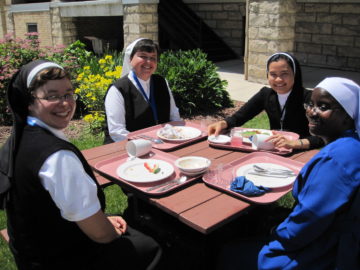Jesus offers basic guidance in this coming Sunday’s Gospel. We offer a Franciscan Gospel reflection and questions written by Fr. Paul Gallagher, OFM for your prayer. They are edited by Franciscan Sister of Christian Charity Sister Anne Marie Lom and Joe Thiel. The excerpts from the Sunday readings are prepared by Joe Thiel. To read or download the complete pdf with excerpts for your prayer, please click here: Franciscan Gospel Reflection August 4 2019. Excerpts are from the Lectionary for Mass for Use in the Dioceses of the United States of America, second typical edition © 2001, 1998, 1997, 1986, 1970 Confraternity of Christian Doctrine, Inc., Washington, DC. Used with permission. All rights reserved. No portion of this text may be reproduced by any means without permission in writing from the c)opyright owner. Photos: St. Anthony Convent, Casa Grande, AZ (photographer Sister Carol Seidl, OSF); Sisters (photographer Sister Cecilia Joy Kugel, OSF)
Luke 12:13-21
Someone in the crowd said to Jesus, “Teacher, tell my brother to share the inheritance with me.” He replied to him, “Friend, who appointed me as your judge and arbitrator?” Then he said to the crowd, “Take care to guard against all greed, for though one may be rich, one’s life does not consist of possessions.”
Then he told them a parable. “There was a rich man whose land produced a bountiful harvest. He asked himself, ‘What shall I do, for I do not have space to store my harvest?’ And he said, ‘This is what I shall do: I shall tear down my barns and build larger ones. There I shall store all my grain and other goods and I shall say to myself, “Now as for you, you have so many good things stored up for many years, rest, eat, drink, be merry!”’ But God said to him, ‘You fool, this night your life will be demanded of you; and the things you have prepared, to whom will they belong?’
Thus will it be for all who store up treasure for themselves but are not rich in what matters to God.”
Background:
In last week’s gospel, one of Jesus’ disciples asked him to teach them to pray, like John taught his disciples to pray. In response, they–and all of us–received one of the richest and most prayed prayers in the Christian world. The parables that were included in last week’s gospel give us some insight into the kind of relationship that God desires to have with us. We are to be persistent in our prayer. God hears our prayers, and He knows how to respond as a loving father. (Luke 11:1-13)
Following last week’s gospel text, Luke’s gospel then records a series of short interactions with the crowds that gather about Jesus to hear him teach and to witness his healing ministry. (Luke 11:14-36) After these short teachings, Luke then describes an incident where Jesus attends a dinner at the home of one of the Pharisees. Jesus is criticized for not keeping the customary rituals of washing before the meal. In response, Jesus then criticizes the Pharisees for their observance of rituals without letting it affect their interior demeanor. The scribes are also offended. Luke notes that as Jesus left the house, the scribes and the Pharisees were plotting together as to how they might catch him in something he was saying. (Luke 11:37-54)
As chapter 12 begins, Luke places Jesus back among the crowds, teaching them that when difficulties come, they should not be afraid of those who can only do physical harm. The God who cares about sparrows also cares about them. (Luke 12:2-9) He assures them that when they have to defend themselves, the Holy Spirit will guide them in their response. (Luke 12:10-12) The text for the gospel for this Sunday follows all of that.
The nature of the request posed here in today’s gospel reading may seem strange to many readers. However, questions regarding inheritance were not so strange in the days of Jesus. Jesus is being invited to become the mediator between two brothers–a role that would only be given to a person who has earned a reputation of being very trustworthy. “Truly worthy of esteem, truly honorable are the peacemakers, for they will considered God-like.” (Mt 5:9) Such a person would seek a solution that would be agreeable to both parties, and would avoid further disagreement that could escalate into bloodshed. In order to be successful, the mediator would need to have the trust of both parties. The case is different here. Jesus’ response indicates that he believes he is being asked out of greed, not fairness.
The scriptures also point to how important the questions of inheritance have been throughout biblical history. The book of Genesis records Rebecca assisting her second-born son, Jacob, in tricking his elderly father into giving him his brother’s birthright (Genesis 27:1-45). Later in Luke, Jesus will tell the well-known story of the prodigal son (Luke 15:11- 32). Within the culture of Jesus’ time, a family inheritance or holding did not have to be divided, but it could be, at the request of one of the sons. When such a request was made, it was perceived as an insult to the family, especially the father, because it implied a wish that the father was already dead.
Following the parable of the prodigal son, Luke records another parable that is probably as much forgotten as the story of the prodigal son is remembered. It is the parable of the dishonest steward (Luke 16:1-8). One of the reasons it is not remembered is because the steward is praised for what appears to be stealing. To most westerners the story does not make sense. But within that parable are some keys to help give understanding to the gospel for today. One of the central difficulties for us is how differently the people of Jesus’ day understood the appropriate use of wealth. Jesus’ contemporaries experienced life’s resources as being in limited supply: water, food, wood, health, children, and even life. When that supply was used up, there was no reserve to draw upon. They also presumed that within the limited supply there was enough for everyone, if no one hoarded or took from another.
Honor demanded that you be grateful and satisfied with what you had, but it also demanded that if you had more than you needed, you would share with another. When people’s actions aligned with those presumptions, their esteem in the community rose, and they could count on the assistance of others when they were in need. The dishonest steward in Luke 16 was acting in a way that was appropriate for his culture. His master’s standing in the community, as well as his own, would rise significantly by his canceling the debt of his neighbor, and it ensured that the dishonest steward would be taken care of when a need might arise. Honor was valued much more than wealth.
The parable that Jesus tells is consistent with the values of the day. The rich man is foolish, not because of his wealth, but because he did not use his wealth wisely. He had the opportunity to build esteem and honor, but chose instead to act out of greed; he valued his wealth more than honor. His death does not come as a punishment, it is simply the end of his time on earth. He can take none of his wealth with him, and he will have no real control over it. He could have died bearing with him the things most valued, the esteem and respect of his neighbors. But instead he died with wealth he cannot take with him, losing the esteem of his extended family and neighbors besides. He has acted foolishly.
Reflection Questions:
1. When you recall your own experience of dealing with questions of inheritance…
2. How have you or are you prepared for your future?
3. Are you aware of a tension within yourself between enjoying the present and preparing for the future?
4. The farmer in the parable did not see that he had more than he could use in his lifetime. When I look that reality, I see…
5. The farmer also missed seeing the opportunity that was being given to him by the abundant harvest. I suspect I need…
6. If you were to die tonight, what do you think people would remember about you? Is that what is important to you?
7. Take some time to talk with God about how you use the gifts of the earth that are entrusted to you, your struggle to make good decisions, or some other insight that arose within you as you reflected on this gospel.




